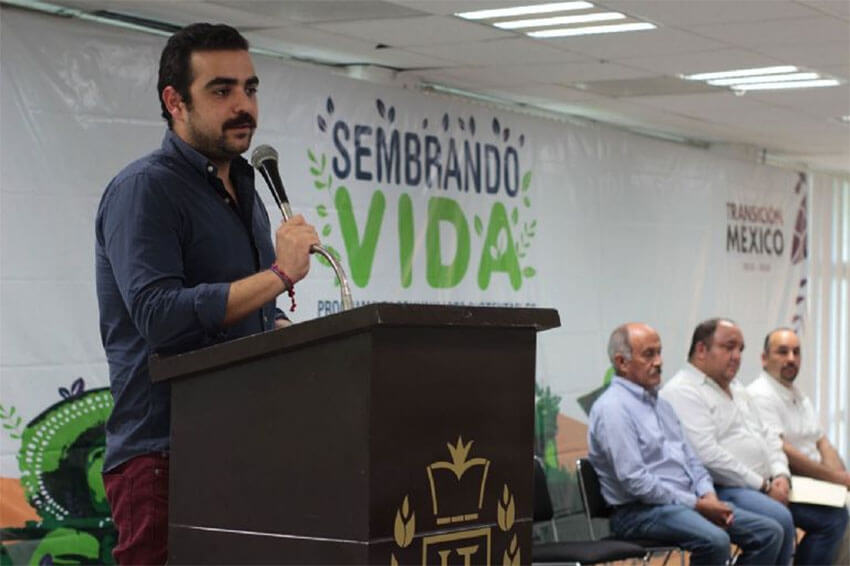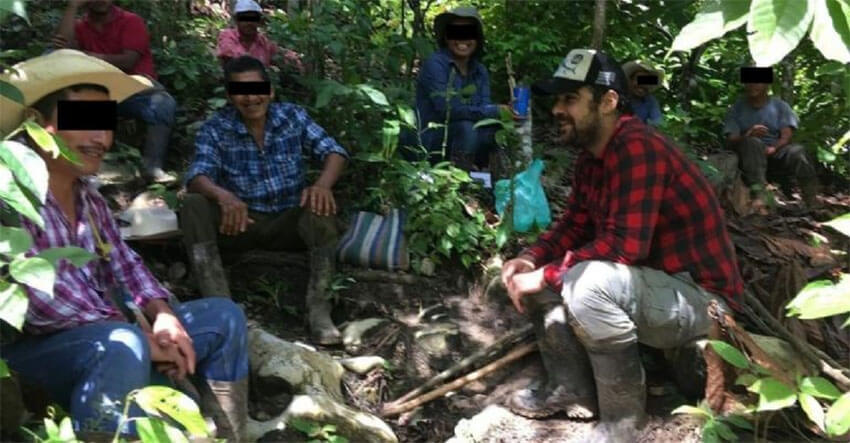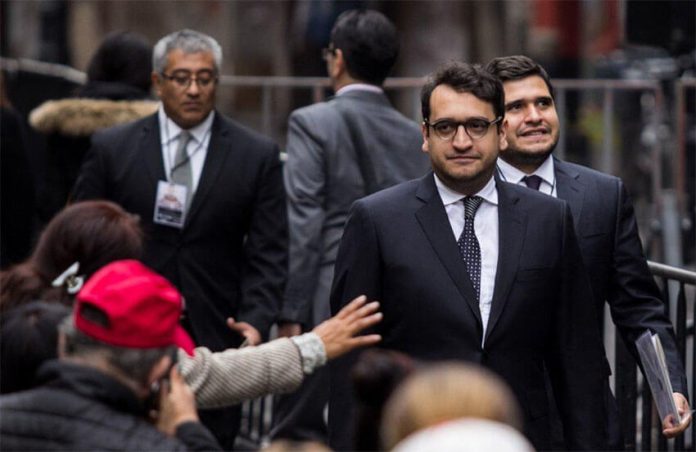President López Obrador’s adult sons and a childhood friend of one of them are at the center of a new investigation that raises yet more questions about Sembrando Vida (Sowing Life), the federal government’s tree-planting employment program.
Published by six media organizations including the news magazine Proceso and the digital newspaper Aristegui Noticias, the investigation focuses on cacao entrepreneur Hugo Chávez Ayala, his involvement in Sembrando Vida and his connection to a cacao plantation in Tabasco owned by Andrés Manuel López Beltrán and the president’s two other sons from his first marriage.
Chávez, a prominent exporter of high quality cacao, agronomist and primary school classmate of López Beltrán, was named as the technical director of Sembrando Vida when López Obrador first announced the program in late July 2018.
The 35-year-old entrepreneur, a neighbor of López Obrador and his family when they lived in Villahermosa in the 1990s, never officially took up that position, but he was also appointed to the program’s advisory board, made up of 20 experts in fields such as agro-ecology and community development. Through that role – and as “unofficial” technical director –he was central to the design of Sembrando Vida and its implementation, especially in Tabasco, according to the investigation.
When he announced the creation of Sembrando Vida at an event in the Lacondona jungle of Chiapas, López Obrador made it clear that the program would support the planting of cacao trees.

“The cacao tree takes three years to produce. What I want is to have 1 million hectares [of fruit and timber-yielding trees] in production before my government ends. Let cacao trees produce,” he said.
Less than four months later, López Beltrán applied to register a new chocolate brand – Rocío Chocolate, a move that marked the beginning of his career as a premium chocolate entrepreneur.
In addition to being a childhood friend of López Beltrán, Chávez told the reporters who conducted the Proceso/Aristegui Noticias investigation that since 2014 he has advised the presidents’ sons on the production of cacao at their 49-hectare property, located in the Tabasco municipality of Teapa.
AMLO’s sons inherited a 16-hectare property from their mother, Rocío Beltrán Medina, when she died in 2003, and subsequently received 32.5 hectares of adjoining land from two uncles. The cacao for Rocío Chocolate is grown on the property.
According to the investigation, Chávez, as a key Sembrando Vida official, promoted the planting of cacao trees in Tabasco, even though local farmers, via a consultation process, ranked the cultivation of 25 other kinds of trees as higher priorities.
“In Sembrando Vida the producers of each state must decide by consensus which trees will be prioritized by the program,” the investigation said.
But Chávez allegedly ignored that rule and at least encouraged, if not demanded, the cultivation of cacao trees in Tabasco. It is unclear whether he predicated inclusion in Sembrando Vida on agreement to plant cacao trees, but would-be beneficiaries were certainly pressured to do so, the investigation indicates.
Chávez subsequently made personal financial gains from the planting of such trees, and stands to make more in the future: he sold 2 million cacao tree seeds to the Sembrando Vida program and entered into commercial arrangements with growers to purchase cocoa beans for his company Agrofloresta Mesoamericana.
There appears to be a clear conflict of interest given that a Sembrando Vida official gained personally – and will continue to profit – from the program.
Sembrando Vida beneficiaries in Tabasco told the investigation they felt an obligation to sell their future cocoa bean harvests to Chávez given that his company was offering a higher price than others, provided agro-ecology training to them and paid for their organic certificates, which cost between US $3,900 and $4,900 and must be renewed annually.
“… We can only sell to Hugo,” one producer said bluntly. “We’re raw material partners but not partners of the company,” said another, who charged that Chávez is the big winner from the arrangement.
“It’s the only option for now,” said the cacao producer, who like other Sembrando Vida participants is paid a monthly stipend of 5,000 pesos (US $230).

Chávez didn’t deny that he expected to benefit from the production of cacao in Tabasco through the Sembrando Vida scheme.
However, he said most of the cocoa grown in the Gulf coast state will go to the “conventional market” because his company only exports high-quality cacao known as cacao fino de aroma. Chávez also asserted that his suppliers have the right to participate in the Sembrando Vida program.
“The increase in the production of cacao is very beneficial for the entire [chocolate making] chain from producers, fermenters and industrialists,” Chávez said, although many cacao trees have died due to inadequate conditions for their cultivation and/or Tabasco growers’ lack of knowledge about them.
He also said that he has promoted the cultivation of other crops in Sembrando Vida, such as coffee, cinnamon and rubber.
The investigation said some people in Tabasco were forced to cut down trees so they could participate in Sembrando Vida. Several other reports have also highlighted deforestation caused by the scheme, which President López Obrador describes as the world’s largest reforestation program.
The president was aware of Chávez’s business interests when he asked him to be the Sembrando Vida technical director and appointed him to the program’s board, according to the report.
Although Chávez has advised the president’s sons on the production of cacao, he denies having any commercial relationship with them.
“However, the links between his company and Finca [farm] El Rocío are eye-catching,” the investigation said.
It noted that in a video conference in September, Chávez introduced his company’s team and the first person he presented was the most senior member.
That person, an agronomist who has worked for Agrofloresta Mesoamericana for seven years, promptly said that he was in charge of Finca El Rocío, a declaration at odds with Chávez’s claim that he has no commercial relationship with AMLO’s sons.
The agronomist, identified by the investigation only as Isabelo, said that he and Chávez “began together on Finca El Rocío seven years ago.”
In addition, the investigation said, cacao that won an award at the International Chocolate Awards 2018 and which the Agrofloresta Mesoamericana website presents as its own was grown at the López Beltrán property.
An aerial view of Finca El Rocío
“This recognition also made it visible that Agrofloresta Mesoamericana employees are part of the production [team] for those cocoa plantations. In addition, both Agrofloresta Mesoamericana and Rocío Chocolate share the same photographs and videos on their websites and social media,” the investigation said.
Chávez simply said, “They’re very pretty images and we have permission to use them.”
“The webpage of the Fine Chocolate Makers Association also says that Agrofloresta Mesoamericana uses cacao from Finca El Rocío and some restaurateurs assert that they’ve bought Finca Rocío cacao from Agrofloresta Mesoamericana. Hugo Chávez insists that it’s the people, [not him], who are confused,” the investigation said.
The implication that Chávez has a business relationship with Andrés Manuel López Beltrán and the president’s other sons from his first marriage is that all of them have benefited, and stand to benefit, financially from Sembrando Vida’s support – and Chávez’s backing in particular – of cacao cultivation in Tabasco. The president – the nation’s self-appointed corruption fighter in chief – has made it clear that he won’t tolerate any of his family members benefiting directly or indirectly from his government.
The Proceso/Aristegui Noticias investigation also said that López Beltrán and Chávez used the same contact person on applications for an organic certificate for Finca Rocío. That contact was Fabiola López Fócil, an Agrofloresta Mesoamericana employee.
The investigation also raised questions about the legal status of López Beltrán’s company, saying that a Mexico City Rocío Chocolate store failed to issue invoices after five purchases were made between May and November.
“Experts consulted assert that it’s unusual to not issue an invoice immediately and that it could be evidence of irregular tax registration,” it said.
The investigation also said that the packaging of Rocío chocolate doesn’t contain all the legally required information. The company is apparently registered in New York rather than Mexico, and has its main office in Delaware, a corporate tax haven, the report said.
Reporters’ attempts to seek comment from López Beltrán about their investigation were unsuccessful.
Another “eye-catching” detail, the investigation said, is that Finca El Rocío is guarded by state police. Reporters sought to use transparency laws to obtain information about why Tabasco police are providing protection for the property, but the police put a five-year embargo on such details.
López Obrador responded to the Proceso/Aristegui Noticias investigation at his regular news conference on Monday, labeling it “deceptive” and “without foundation.”
“… [My sons] have never accepted support from the government and have nothing to do with the Sembrando Vida program,” he said.
The president rejected claims that Chávez, whom he acknowledged as an “agronomist friend of my sons,” was responsible for the creation or design of Sembrando Vida.
“This program came out of here, this head,” AMLO said, referring to his own brain. “Like the seniors [pension] program came from here,” he added, pointing to his heart.
The president charged that the intention of the investigation – on which Notas Sin Pautas, Meganoticias, Emeequis and Connectas also collaborated – was to “stain” him and his family.
“… What they suggest in their report is not true and I also want to clarify that Proceso and Carmen Aristegui [the journalist who founded Aristegui Noticias] have never been in favor of our movement. They say it’s because they’re independent, while I hold that they are independent but independent of the people,” López Obrador said.
“… They’ve never done journalism in favor of the [common] people, I want to make that clear. … It’s thought these pseudo-objective, pseudo-progressive, pseudo-independent media organizations have links to us but they don’t, … there’s no affection [for the government],” he said.
Aristegui responded to the president, asserting that her media company is neither in favor nor against his “movement” – the ruling Morena party that swept him to power in 2018.
“This space [Aristegui Noticias] is simply a space for journalists,” she said.
“And I would send one last message to President López Obrador: you know that I respect you, I respect your long battle to reach the presidency of the republic but sereno moreno!” Aristegui said, using a proverb to urge him to calm down.
“Read the report and we’ll talk later. And you tell me if the business activity of your sons is something to worry about or not.”
With reports from Proceso and El Universal
